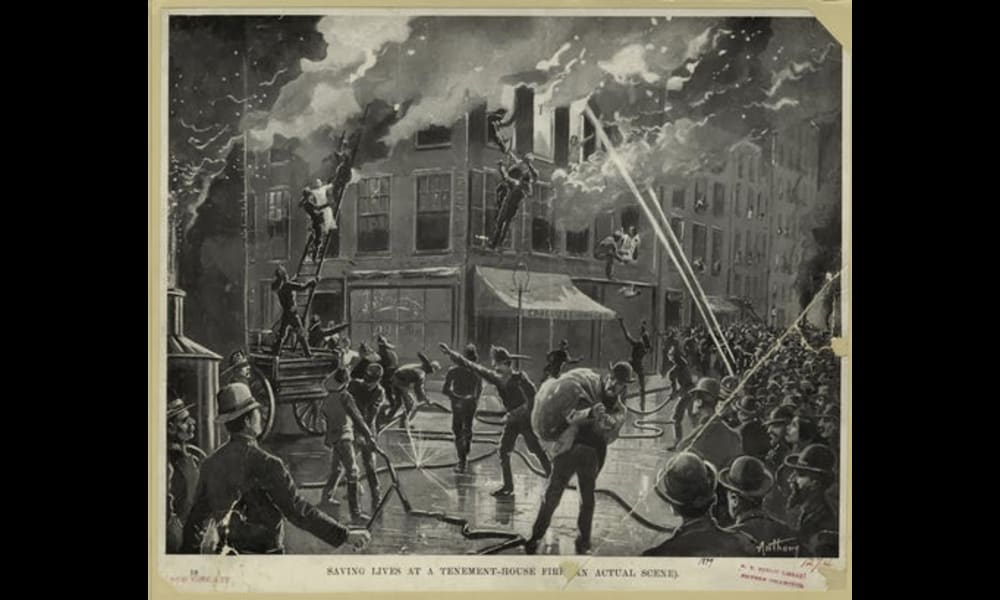A Changing Society (1821)
• On Monday, September 17, 1821, at around two o’clock in the morning, a fire broke out on Sackville Street. Three houses were pulled down during the fire: that of Messrs. Henry Crosskill (a member of the Union Engine Company), Whitecross and Muirhead. The first two were pulled by order of a few Firewards, among whom, Samuel Cunard and John Albro (Halifax Firewards meeting minutes 1804-1835). Although not mentioned, the town fire companies would have been present at the fire. According to their respective by-laws, the Union Engine Company, Axe Fire Companies, and the Hand in Hand, Heart and Hand, Sun Fire and the Phoenix Fire Company members all had to report to all alarms of fire. The major point that came to light after the event is that, for the first time, the press publicly scolded the inhabitants who showed up strictly for the spectacle offered by the fire, and this behaviour would persist throughout the 1820s and 1830s. Previously, on December 21, 1816, an inhabitant had pointed out the problem in an opinion letter (Nova Scotia Archives 1821), but before that date, the inhabitants had never been criticized for their lack of action during a fire. Here is the complete account from the Acadian Recorder:
The greatest calamity to which man is exposed in civilized society is the ruin and desolation which fire occasions, when it ceases to be an obedient and useful servant and attains an awful and destructive ascendance. Halifax, like all towns which are chiefly composed of wood, is exposed in a peculiar degree, to its ravages; and when it breaks out it excites a proportionate terror in the minds of all. We had been happily exempted from any return of this disastrous visitant for nearly two years, when on Monday last, about 2 o'clock in the morning, a most alarming conflagration originated in a bakery in Sackville Street, and has involved a greater number of sufferers than any previous one we have ever witnessed. The baker, it seems, had placed against the door a quantity of wood which he had dried in the oven, that it might kindle easily in the morning. In this situation it was left, and after a lapse of some time, generated flame, which communicated to the building. From the lateness of the hour and the position of the bake house, the fire gained a considerable height before it was discovered. The buildings by which it was surrounded were of wood - the flames extended on all sides - and the whole block, with the exception of the houses occupied by Mr. H. Crosskill, Mr. T. Muirhead and Mrs. Neilson, and a stable, fell a sacrifice to the devouring element. Of twenty three [sic] houses no memorial is left save the chimnies which stand desolate and naked, and we are assured that upwards of forty families "were burnt our of house and hall. Only (pounds)1550 was insured. As the furniture and stock were mostly saved, the chief loss has fallen on the proprietors; almost the whole of whom are widows and poor persons, quite unable to repair their heavy misfortune. A subscription has been set on foot for the benefit of the sufferers, and we are happy to learn that a handsome sum has been collected.
Map of Halifax drawn three days after the fire (Library and Archives Canada 1821).
Fortunately, the fire was confined to one block: although the houses on the opposite sides, were in imminent danger, and were only saved by the most meritorious exertions. Their fronts are scorched; and in the house belonging to Mr. Robie the windows were nearly all destroyed from the excessive heat.
Had it not been for the army and navy there is no saying where the fire would have stopt [sic]. Their vigorous and unremitting exertions were one main cause of its being at length mastered and extinguished. His Excellency the Lieutenant Governor was conspicuous, directing and spurring on all within his reach and the officers of the garrison and of His Majesty's ships were animated by the same spirit, and distinguished themselves by an extraordinary activity. Sir Robert Le Poer French, colonel of the 74th regiment, who had arrived from New-Brunswick on the Saturday preceding, rendered essential service; and captain Napier of the navy hazarded his life with a noble and gallant freedom in his successful endeavours to interrupt the progress of the flames. It may seem invidious where all deserve praise to single out instances of individual merit, but the efforts of Major Crawford of the artillery demand particular notice. His excellent judgment and unwearied perseverance have been remarked at every fire which has occurred of late years, and on the present occasion he amply sustained his reputation. Lord Lennox, aid-de-camp to the Governor, colonel Mackie, the commandant of the garrison, lieutenant colonels Arnold, Harris, Ximenes, Beresford and Waterhouse; captains Fanshawe, Bouchier and Collier, Charles Blackadar, Esq. and other officers of the military, naval and commissariat departments, exerted themselves with a meritorious zeal.
But we are compelled to speak in very different terms of the conduct of our towns-people. The respectable part of the community were [sic] active as usual; but many inhabitants, and these not of the lowest order, promenaded around the burning block, with their hands in their pockets, with as little shew of humanity and concern as if the sublime and awful spectacle before them had been only some panoramic fiction. Such infamous indifference cannot be too severely reprobated, and we should rejoice to see it overtaken by a prompt and disgraceful punishment. The power of commitment is lodged in the hands of the magistrates and fire-wardens; and we trust that it will be used in future with greater freedom. Notwithstanding the immense crowd assembled, there was actually a difficulty in forming lines to the water, and the engines were at times imperfectly supplied. We are ashamed of the painful duty we are here discharging, but we hope that the public indignation which is everywhere expressed and to which we, as one of the organs of public feeling, give vent, will save the necessity of its recurrence hereafter. Till now, Halifax has been justly celebrated for the skill and prompt activity with which fires were extinguished, and we have never before had occasion to notice any general backwardness of the inhabitants. May we never have cause to notice it again!
The manner in which the fire was conducted as a whole, evinces the necessity of revising, or rather of more rigorously enforcing, the existing statutes. A partial exemption was very properly bestowed by the Act of 1820 on stone and brick houses from assessment for houses pulled down; and additional encouragement is held out by the lower premium at which they can be insured from fire. But as we still see rickety [sic] wooden castles ascending, it is time, we think, to prohibit the erection of any other than brick or stone houses, within the precinct of the town and with the exception of cottages for the poor. Enactments on this principle are now in most if not all of the neighbouring cities. The man who erects a substantial stone house does an important service to the public. Had Mr. Hartshorne's been of wood, the whole of the block in which it stands would most probably have been consumed (Nova Scotia Archives 1821, p. 3).
A card of thanks (Nova Scotia Archives 1821)
• On September 21st of the same year, the Firewards, being aggravated by the “disgraceful indifference” of the inhabitants during the last fire, adopted a series of regulations via a set of resolutions (Halifax Firewards meeting minutes 1804-1835):
1. That in future, the whole management and direction of the proceedings for extinguishing fires, be entrusted to eight Firewards, to be particularly appointed for this purpose, four of whom to be sufficient to act, and that the duty of forming and preserving the lines and procuring water for the Engines be entrusted to parties of not more than three Firewards, stationed on the different sides of the block in which the fire is burning, or near the spot where the water is to be obtained.
2. That the residences of the inhabitants present or near the fire of every description, except members of the respective Fire Companies, the Engine-men, Axe-men, and Constables with their staves, be formed in lines for the conveying of water to the Engines and in such places as the Firewards attending shall direct. And that any person quitting the station assigned to him or delaying or neglecting to fall into the lines immediately, be taken into custody by the Constables attending, and committed in order to be prosecuted against as the Law directs.
3. That the preservation of goods and furniture from the buildings in danger be entrusted solely to the owners, and to those gentlemen of the associated Fire Companies, who wear Fire Caps (they being provided with bags for the purpose) and all propriety saved shall be deposited under the charge of guards posted to protect it.
4. That the Axe Men repair as near as possible to the building on fire and remain together until called on by the Firewards, and do not leave the Fire without their permission.
5. That the Constables attend with their staves and that each, as he arrives, put himself under the direction of, and attend on, some one of the Firewardens and remain with him to inform his orders.
6. That six substantial moveable pumps be forthwith provided and entrusted to as many careful and active persons to be appointed by the committee, whose duty it shall be to convey the same to the wharves or wells nearest the fire according to the stations to be particularly assigned to them, and to keep them in good order when not in use.
7. That these Resolution be communicated by the Secretary to the several associated Fire Companies in Town, with a request that the Members thereof will endeavour to enforce a punctual compliance therewith.
•At that same meeting, the Firewards made a request to the Lieutenant-Governor to authorize the re-publication of the Garrison’s General Orders from January 9, 1817 (Halifax Firewards meeting minutes 1804-1835). This general unwillingness of the citizens to help at fires would continue and later culminate with the Act of 1835.


